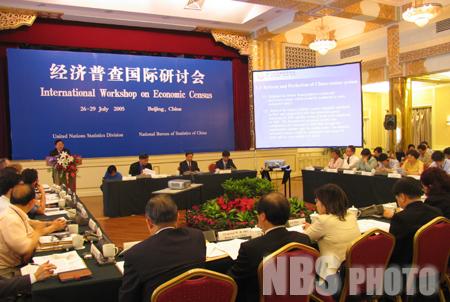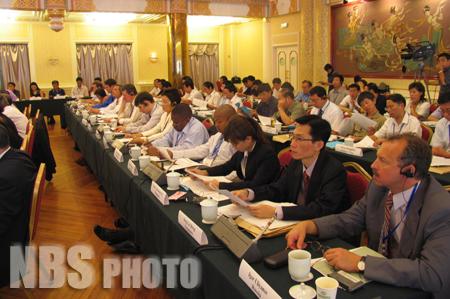|
During the quality approval and data processing phases of China s First National Economic Census, United Nations Statistics Division (UNSD) and the National Bureau of Statistics of China (NBS) jointly organized the International Workshop on Economic Census in Beijing from 26 to 29 July, with the economic census as the subject. Attending the workshop are 45 statistical officials and specialists from 32 countries, regions and international organizations. Also attending the meeting are a hundred officials and experts from statistical offices of different provinces, autonomous regions and municipal cities, and from economic census organization of State Council.
At the inaugurate ceremony of 26 June, Mr. Li Deshui, Commissioner of NBS, Assistant Head of Economic Census Leading Group of State Council, and Mr. Paul Cheung, Director of UNSD made opening addresses respectively. Mr. Li Deshui, representing NBS, Mr. Mesenbourg representing U.S. Census Bureau gave key note speeches respectively. For the future work of census, Mr. Li Deshui emphasized that and it is the season of harvest to redound country and the society, as the large scale general census enumeration and data processing has completed. In this key phase, we have the following plans: Firstly, developing and improving registers for basic units. This is a continuing task of economic census, and an important goal which has to be achieved. We need to establish complete registers for basic units, on the groundwork of name lists of basic units obtained from the census, and to develop mechanism for timely updating of the registers jointly by other administrative departments concerned, making them dynamic databases. Information from such registers is useful for government economic management, scientific research and for government statistics as well. Secondly, revising the historical data based on the census results. Data from economic census are more complete and accurate when compared with annual statistics; hence, there will be differences between them. Other countries have the experience of revising historical data on the basis of verified census data. This is not changing the history, but is reflecting, in a more objective and accurate manner, the process of economic and social development, and the real aspects of the history. Thirdly, establishing a perfect statistical survey system for the tertiary industry. During the planning economy period, the statistics of material production sectors were paid more attention, but the statistics of the service sector was ignored. This problem has not been completely solved until now. Mainly there exist the omission in the coverage and statistical units of the tertiary industry, therefore it caused under-estimate of the proportion of the tertiary industry in the GDP. Through the economic census, In order to reflect the real level of the tertiary industry, a sound statistical system for the tertiary industry must be established and strict implementation must be followed. Fourthly, fully utilizing the census results. The data from the census are tremendous and worthy fully utilization. The main tabulation results of the census after conciliation will be released to the public by Economic Census Office of the State Council and the National Bureau of Statistics in this September. And the census results at provincial level will be release in succession. The key topic research will be organized and conducted by research institutes and universities through open bidding. The keystone of the census results utilization are: providing the basicinformation for the formulation of the eleventh five year plan ; providing references for macro-economic policymaking through in-depth research of the national economy, and providing related information for the public and the forms. It is also planned to combine the census data with GIS so as to demonstrate the census results to the users in a direct manner.
It is reported that the workshop will discuss the related topics such as the establishment of the business registers, the coverage, content, data collection and data processing of the economic census, and the integrated system of economic statistics and the future development of the economic census. A field study trip to Beijing Municipal Bureau of Statistics will be organized during the workshop. In the evening of 25 June, Mr. Wang Yang, Vice Secretary-General of the State Council and Assistant Group Leader of the Leading Group of the First National Economic Census of the State Council, consigned by Mr. Zeng Peiyan, Vice Premier of the State Council, and Group Leader of the Leading Group of the First National Economic Census of the State Council, gave his warm congratulation to the workshop and warm welcome to the officials of UNSD and the representatives of different countries and organizations. |
Related News
Photos
More>>trade
- Mr. Frederick W H HO Was Retained as the Statistical Advisor of NBS
- Commissioner Xie Fuzhan meets with the Visiting Delegation from Macau Statistics
- Delegation of Statistics Canada on Social Statistics Project Visited NBS
- Mr. Lin Xianyu Met with Japanese Statistical Delegation
- Mr. Xu Yifan Met with World Bank Mission
market
- Deputy Commissioner Zhang Weimin Meets with the Professor. Lepkowski from the
- Press Conference of the 14th World Productivity Congress held in Beijing
- Chinese Statistical Delegation Participated UNSC 2008
- President of Japanese Marketing Research Association Paid a Visit to NBS
- MOU Signing on Statistical Education Cooperation Held in Korea
finance
- Senior Consultative Meeting on International Comparison Project Held in Beijing
- Sino-Japanese Trade Statistics Technical Cooperation Project Mission Visited
- Mr. Lin Xianyu Participated the International Seminar on the Development of
- President of AGB Nielsen Media Research Paid a Visit to NBS
- The Ninth Japan-China Symposium on Statistics Held in Japan







